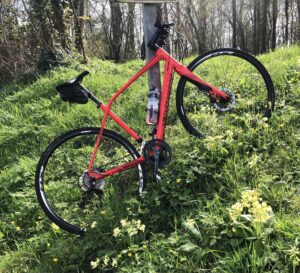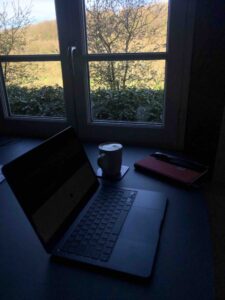 Easter, and Spring more generally, is a time of renewal and beginnings. As I sit here in my beloved Normandy overlooking the crabapple and magnolia blossom, I see life coming back to life. Five years ago, pretty much to the day, I drafted a table of contents for my first book; a year ago, pretty much to the day, in my writing practice journal I declared a transition from book 1 to book 2. And again, Easter time, I embark on the new: I am here for 6 days of musing and mulling on that second book – a working title “Humanistic psychotherapy: from first to second order change”.
Easter, and Spring more generally, is a time of renewal and beginnings. As I sit here in my beloved Normandy overlooking the crabapple and magnolia blossom, I see life coming back to life. Five years ago, pretty much to the day, I drafted a table of contents for my first book; a year ago, pretty much to the day, in my writing practice journal I declared a transition from book 1 to book 2. And again, Easter time, I embark on the new: I am here for 6 days of musing and mulling on that second book – a working title “Humanistic psychotherapy: from first to second order change”.
You read it here first 🙂
As soon as I made the decision to re-shape this project, knowing I was coming on writing retreat in France filled me with a new kind of delight, a rejuvenation. Life and my bodymind have felt full, saturated…and time away now takes on a sense of a dual purpose: the nurturing of my ideas for this book, and a nourishing of my bodymind; writing is my soul food.
Grabbing a coffee and sitting down to blog feels like a slow, easeful immersion into my time here…a warm-up to not only get the writing juices flowing, but also a chance to sit down and “meet myself”. What was so clear in the dialogue with my critical friend recently was the importance this second book project had in (again) writing down my story, my experiences. It was a powerful process in creation of my first book; and it is the way I want my writing career* to proceed. Rather than try to write a definitive truth, to write MY truth.
One of the (many) delights in facilitating the enneagram group for therapists these past two months has been to facilitate and witness young therapists’ experiential process. I wrote a little about one bodhisattva last week, Manjushri; and common to all bodhisattvas is the three ways they may become a vehicle for helping others:
- The shepherd, who guides “the flock” from behind; forsaking her own awakening in prioritising others go first
- The ferry-woman, who rows the boat with others, ensuring all get to the other shore
- The monarch, who leads others to enlightenment through their own example
I guess I share this as I ponder my approach to therapy, to supervising, to teaching, and thus to writing. I see more of “Helen the shepherd” while with clients**, and yet in my role as facilitator and educator I function more as a “monarch on the boat”! A bit of both / and. For sure though, I write with a sense of “this is how I did it, and lets explore together how you find your way”.
I don’t want to write a textbook on “how to do humanistic psychotherapy”; rather, I want to share how I have developed my way of practice, and why I see those elements as important for an effective approach to healing. With over 30 years experience of being in the “helping professions”*** I can see how my mode and view of bodhisattva activity has shifted. From “trying to help” to “helping others help themselves”. I entered my counselling training with a common misconception about how “helping”; and years of therapy, years of meditation practice have informed how I now see at the core, this work is (and must be?) based on being a human being, a fellow (with all my suffering) human being.
As I wrote that, I came to ponder human to humanism to humanistic. This thread feels like an important one to follow through as I begin this writing project. Excuse the laziness of my Googling and on landing at wikipedia that cites Andrew Copson’s work:
- Humanism is naturalistic in its understanding of the universe; science and free inquiry will help us comprehend more about the universe.
- This scientific approach does not reduce humans to anything less than human beings.
- Humanists place importance of the pursuit of a self-defined, meaningful, and happy life.
- Humanism is moral; morality is a way for humans to improve their lives.
- Humanists engage in practical action to improve personal and social conditions.
It strikes me that to be a (true) humanistIC therapist means to not help but rather empower. When we (myself included 20 years ago) “help” from a place of our own wound (i.e. helping others helps our own esteem and worth), we unwittingly step into an “expert”: and endanger the I-it mode of relating spoken of by Buber. To work through the I-Thou is actually quite radical when you think of it: it is to recognise we don’t know what is best for others, that we don’t know – full stop.
 So, why write a book on “not knowing” or more accurately, coming to “un know”? Well, for me, this is the nub and rub of my motivation. The humanistic tradition of therapy also comes by the name of “existential-phenomenological”. I SO appreciate our philosophical underpinning. There is a trap however: our Western minds lean toward the conceptual; and in delighting in the existentialism, we can neglect the phenomenology. I want to write a book that details a journey from knowing (or thinking we know), to a knowing we don’t know others’ experience, only can only ever know our own.
So, why write a book on “not knowing” or more accurately, coming to “un know”? Well, for me, this is the nub and rub of my motivation. The humanistic tradition of therapy also comes by the name of “existential-phenomenological”. I SO appreciate our philosophical underpinning. There is a trap however: our Western minds lean toward the conceptual; and in delighting in the existentialism, we can neglect the phenomenology. I want to write a book that details a journey from knowing (or thinking we know), to a knowing we don’t know others’ experience, only can only ever know our own.
How DO we empower the individual sitting across from us?
By offering our own individuality – with all its imperfect perfection
And share that dialectical dialogue of our own knowing (which is all we can know – the rest is projection, fantasy, introjection)
Undoubtedly for me, that journey of knowing has been one on becoming more confident in my own experiencing, a direct experiencing of bodymind that meditation offers. This is an edge for me as I come to think of this book – because mastery of humanistic practice is not predicated upon being a mediator: I don’t want anyone to conflate a humanistic therapy with a transpersonal one*** It can help, but there are also other ways to come to know our own experiencing. Indeed, writing is another!
And so, this “warm-up” comes toward an end. The sun is shining here, and I consider a more physical warm-up – its impossible to come to France without my bike! I know the legs turning will also assist those back-burner process so informative for writers, the “place of subconscious mental deliberation”. I trust that somewhere in my psyche, the creative threads will continue to be woven, allowing my conceptual mind to step back, rest.
————————————————
*wow, that felt odd to write…sounds like I kinda like doing this AND I see a continuation of it
**in a “process directive” way, not advising or leading
**starting as sports coach, to life coach, to counsellor, to psychotherapist…and teaching spanning that entire arc
****although I do see an inevitable arc where we land if we continue the trajectory of humanistic ideas and practice, especially around how we think of, experience, “self”

